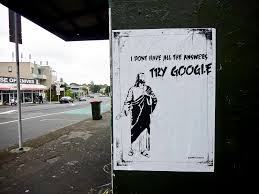 A recent essay in the Sunday Review Section of the New York Times made several observations about religion in contemporary America by analyzing a huge collection of Google search data. In “Googling for God,” economist Seth Stephens-Davidowitz examined the search results for various religious terms and questions in relation to where the people lived and when they performed the searches. Stephens-Davidowitz’s work offers an excellent illustration of the pros and cons of using big data analytics to study religion. Three quotes from his essay show where the biggest challenges can be found.
A recent essay in the Sunday Review Section of the New York Times made several observations about religion in contemporary America by analyzing a huge collection of Google search data. In “Googling for God,” economist Seth Stephens-Davidowitz examined the search results for various religious terms and questions in relation to where the people lived and when they performed the searches. Stephens-Davidowitz’s work offers an excellent illustration of the pros and cons of using big data analytics to study religion. Three quotes from his essay show where the biggest challenges can be found.
-
“If people somewhere are searching a lot about a topic, it is overwhelming evidence those people are very interested in that topic.”
This is the key methodological principle used in Stephens-Davidowitz’s analysis: the frequency of Google searches correlates to the intensity of personal interest. At one level this seems like a reasonable premise. In fact, this principle is very close to the “continuity hypothesis” used by dream researchers to correlate frequencies of dream content with personal concerns in waking life. Many dream researchers, myself included, have pursued studies of dream content using the continuity hypothesis to make inferences about people’s waking lives—if a person dreams a lot about sports, for example, we can confidently predict that sports are an important concern in the person’s waking life.
Stephens-Davidowitz does something similar when he connects Google search data to people’s religious concerns and questions. The problem, however, is defining “very interested.” What exactly can we infer about a person based on their entry of a Google search term? They are “interested,” of course, but interested in what way, and how strongly? What prompted their search? Is there anything distinctive about people’s searches for religious terms compared to non-religious terms?
Until these kinds of questions can be answered (ideally with lots of systematically analyzed empirical evidence, not just one-off studies), the use of Google search data to draw conclusions about religion remains on shaky ground.
In dream research we have many decades of studies that have helped us hone in on “emotional concerns” as a primary point of continuity between dreaming and waking. We also have statistical baselines of typical dream content to help us identify meaningful variations in the frequency of certain aspects of dreaming (see, for example, the Dreambank of G. William Domhoff and Adam Schneider, and the Sleep and Dream Database (SDDb) that I direct). If the use of Google search data included these kinds of analytic aids, the results would be much stronger and more convincing.
-
“Sometimes Google search data, because of Google’s status as a kind of universal question service, is perfectly suited to give us fresh insights into our offline lives.”
The idea of Google as a “universal question service” has great appeal, not the least because so much of the information is easily accessible for public study. This is one of the great boons of the era of big data, and new studies of this treasure trove of information are bound to increase in future years.
A potential problem, however, is a tendency to blur the distinction between a) what Google offers its users and b) who those users are. The fact that Google enables people to ask all kinds of questions does not mean that all kinds of people are asking those questions. Google users are not necessarily representative of the US population as a whole, and we do not know how representative the Google users are who are searching specifically for religious terms. We do know that when people perform a Google search they are connected via technology to the internet, they are interacting with a global corporation, and they are being shown numerous commercial responses to their search. These circumstances should qualify our assumptions about who uses Google and how they engage with the search function.
-
“There are 4.7 million searches every year for Jesus Christ. The pope gets 2.95 million. There are 49 million for Kim Kardashian.”
This quote comes at the end of the essay, and it perfectly encapsulates the difficulty of explaining the significance of Google search results. According to the findings cited by Stephens-Davidowitz, Kim Kardashian gets ten times the search results of Jesus Christ. What exactly does that mean? That Kim Kardashian is ten times more interesting than Jesus? That she is ten times more popular, or more important, or more influential?
The problem is that Google search data do not meaningfully measure any one thing, other than the tautological fact of having entered a specific search term. The results of analyzing these data seem admirably clear and quantitative—4.7 million vs. 49 million!—but they do not easily or self-evidently map onto the actual beliefs, feelings, and attitudes of the general population.
The good news is that these are tractable problems. Real progress can be made by more detailed studies and more systematic correlations of the data with genuinely meaningful aspects of people’s lives. This fascinating essay by Seth Stephens-Davidowitz helps people who study religion see where these new analytic endeavors can be most fruitfully pursued.
Note: first published September 24, 2015 in the Huffington Post.
